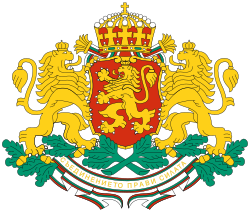| Vice President of the Republic of Bulgaria | |
|---|---|
| Вицепрезидент на България (Bulgarian) Viceprezident na Bǎlgarija (Bulgarian Latin) | |
 | |
| Style | Her Excellency |
| Residence | Bojana Residence, Sofia |
| Term length | Five years, renewable once |
| Formation | 1 August 1990 |
| First holder | Atanas Semerdžiev |
 |
|---|
The vice president of the Republic of Bulgaria is a position, established by the Constitution of Bulgaria, and the only active vice presidential office in the European Union (EU). [Note 1]
Contents
- The First Deputy Chairmen of the State Council of Bulgaria, 1971–1990
- Vice President, 1990–present
- Elected by parliament, 1990–1992
- Directly elected, 1992–present
- See also
- Notes
- References
The vice president is elected by popular vote, alongside the president. Candidates for president and vice president run on their party ticket and are prohibited from serving in any other post upon election.
According to the constitution, the vice president shall be the principal assistant to the president in their official duties. [1]
In 1971–1990, the Chairmen of the State Council — Todor Zhivkov (1971–1989) and Petar Mladenov (1989–1990) — were the heads of state of Bulgaria. The First Deputy Chairmen of the State Council were deputy heads of state. The State Council was abolished on April 3, 1990.
Below is a list of the first deputy chairmen of the State Council and vice presidents of the Republic of Bulgaria:






